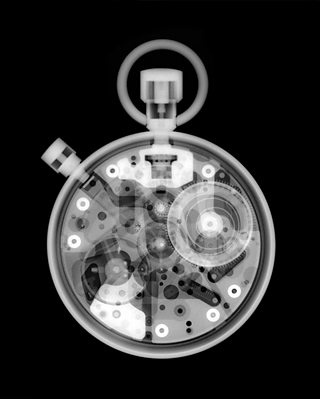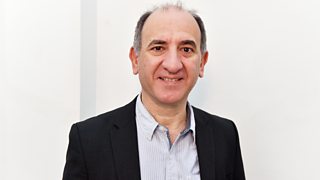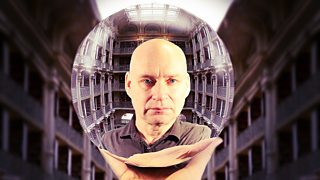Does time move faster as we get older?
How exactly does the human brain calculate the passing of time? Why are the results often so distorted, with time either dragging or flying by? And does it accelerate as we get older? In Why Time Flies (and how to slow it down) writer Armando Iannucci meets physicists, psychologists and philosophers to help him unravel the emotional, physical and cultural factors which affect our perception of time. What, if anything, can be done to slow it down?
The more emotional or aroused we are, the more slowly time passes
Experimental psychologist Ruth Ogden has studied how our level of emotion and feelings of arousal colour our perception of time. Participants in tests were given short electric shocks or shown provocative images and asked to estimate how much time had passed. When participants were very aroused, particularly with negative stimuli like pain or unpleasant pictures, these events were judged as lasting for longer than neutral or calm events.

“When we’re very aroused – when we’re sweating a lot, when our heart’s beating very quickly – these are the scenarios in which time distorts,” says Ruth.
The more attention we give time, the slower it moves
The other big factor to emerge from Ruth’s research was the amount of attention we give to time.
If we’re in a pub having fun with friends, time will feel like it’s flying by. “This is because you’re not paying any attention to time,” says Ruth. We get the opposite effect when we’re bored and clock-watching. “When we pay more attention to time than normal, we see that time drags by,” says the psychologist.
A brush with death can make time feel like it’s slowing down
When neuroscientist David Eagleman was a child, he fell off the roof of a house. Plummeting to earth seemed to take a very long time, which inspired him to study how a near-death experience might slow time down.
In a dramatic experiment, David began throwing people backwards off 150-foot-high platforms, to see if time would decelerate for them. Each participant had a perpetual chronometer on their wrist, which flashed up information. It was too fast to be interpreted by the brain in normal circumstances, but decipherable if time was to slow down. After exhaustive tests David and his team came to a clear conclusion: “We definitely found that people are not able to see in slow motion.”
Time may feel like it’s slowing down when we’re in or avoiding an accident, but this is just our perception.

Different cultures sense time differently
Psychologist Gamze Arman says some cultural groups are simply more time sensitive than others.
The North American cultures are more deadline oriented, she says. “In such cultures the focus is on being fast, and time is seen as a scarce resource, like a commodity.” Asian cultures, on the other hand, can be more patient and slower. In her native Turkey, she says, they veer from one extreme to the other: lunches are long, drawn out affairs, but once back in the office everything accelerates. Gamze believes that because of their looser attitude to time, particularly at lunchtimes, Turkish people are more likely, at other times, to feel that time is flying by than the more time-clenched British.
Time flies for flies
Zoologist Andrew Jackson has studied how time might be perceived by animals and insects. He devised experiments to measure the flicker fusion rate of different creatures. This is their ability to detect separate flashes of a fast, flickering light.
The flicker fusion rate for the average human is around 50 to 60 flashes per second. But for insects, it’s considerably faster – as high as 240 flashes per second for some kinds of fly. Flies experience a world that’s fast and rapid; with a sense of lots of information happening in a short space of time. They can probably see a fly swat coming a mile off, he says, and that’s why they’re able to react and move out of the way. “For them, it feels like time is moving slower than it would be for us,” says the zoologist.

Does time speed up as our brains slow down?
Armando Iannucci asks Professor of mechanical engineering, Adrian Bejan.
Time speeding up could be explained by mathematics
Kit Yates from the University of Bath believes the phenomenon of time speeding up as we age can be explained by mathematics.
If we’ve made a lot of memories our brain thinks there must have been a lot of time. Fewer memories and our brain thinks it’s been a much shorter period.
“There’s a mathematical theory that we perceive a period of time as the proportion of time that we’ve already lived through,” he says. For a two-year-old, a year is half of their life, which is why the time between birthdays seems to take an age for young people. By the time we’re ten, a year is just 10% of our life, so the wait becomes more tolerable.
“This idea suggests a logarithmic scale to the perception of time, or an exponentially increasing speed to the passing of time,” says the mathematician.
The more memories we make, the more time we think has passed
Ruth Ogden believes memory is crucial for calculating how quickly time has passed. “Our brain uses the amount of memories that we’ve created to make an estimate of duration,” she says. If we’ve made a lot of memories our brain thinks there must have been a lot of time. Fewer memories and our brain thinks it’s been a much shorter period.
And memory playing its tricks explains why time speeds up when we age, says David Eagleman. “When you’re a child you’re laying down so much new memory about everything… As you get older you generally understand the world and how it operates and so your brain doesn’t have to write as much stuff down.”
Is there a way to halt this acceleration of time as we grow older?
Adrian Bejan says sleep is key. An alert, rested brain will click faster, slowing down time. “Avoiding fatigue is the technique that works at every stage in life,” says the physicist.
Philosopher Christoph Hoerl thinks we would benefit from adjusting our entire understanding of how time travels. “If we became more temporally neutral – think of past, present and future events as all of equal significance – that might have a positive effect on wellbeing,” says the philosopher. It could relieve the strain of time dragging or flying.
David Eagleman believes the secret is in novel experiences. “The brain has what’s called repetition suppression,” he says. If we do the same thing over and over, the brain spends less energy on it. When we introduce something new, our brain expends more energy, and that corresponds to the estimated duration. “The key thing, at all ages, is to constantly make sure that you are seeking out new things to do.”
Won’t novel and fun events make time fly? In the now, maybe, but retrospectively things will feel like they’ve lasted much longer, because of all the new memories we’ve made along the way.
More from Radio 4
-
![]()
Why Time Flies (and how to slow it down)
Armando Iannucci explores why time appears to speed up alarmingly as we age.
-
![]()
Just One Thing - with Michael Mosley
What's the one thing that you should be doing to improve your health and wellbeing?
-
![]()
A Sense of Direction
Might humans have an inbuilt compass like homing pigeons? How can we rediscover it if so?
-
![]()
Made of Stronger Stuff
Psychologist Kimberley Wilson and Dr Xand van Tulleken ask - one body part at a time - how can we change?




